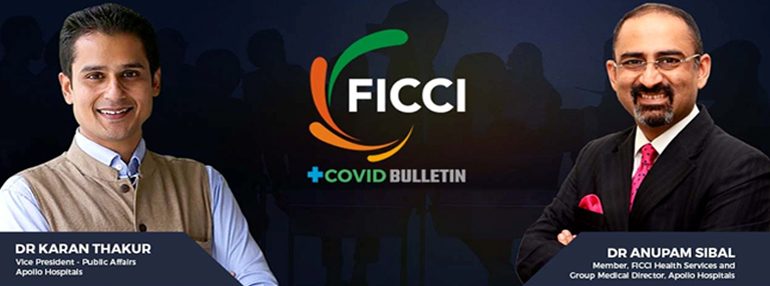As you would know, the current Covid wave driven by the Omicron variant is evolving fast in the country. In this regard, your business chamber FICCI is organising regular COVID bulletins to sensitise the membership and the general populace about this evolving threat and how to tackle it. We organised the first such Covid bulletin this Friday, wherein Dr Anupam Sibal who is a member of FICCI Health Services committee and the Group Medical Director of the Apollo Hospitals joined us for a chat with Dr Karan Thakur to address pertinent questions we have received from our membership and the public. You could watch a recording of this session at our YouTube (please embed the YT below)
We are producing an edited transcript of this session that you could use. We hope you find this useful.
Edited Q&A transcript from the YouTube session between Dr Anupam Sibal, Member, FICCI Health Services Committee and Group Medical Director, Apollo Hospitals and Dr Karan Thakur, Vice President, Public Affairs, Apollo Hospitals
Dr Karan Thakur
What are some of the definitives that have already emerged two weeks into this third wave?
Dr Anupam Sibal
A very important point that I think we should address. Of course, it’s early days, so things can change. We are basing this on the scenario in South Africa, then in Europe and the United States, and what we see here is, one, this is highly transmissible. So, if one person in the family has it, it’s pretty likely that other family members will get it. It produces symptoms just slightly different (from the earlier variant). You don’t get loss of taste and smell, you get fever, an itch in the throat, then some amount of cough. Kids get a bit of nausea; you can get a fever up to 103 or so. But you don’t get that shortness of breath, chest pain; you know that feeling that you got with the Delta, and what has been shown now globally that in those vaccinated, the manifestations are less severe than those who are unvaccinated. The need for hospitalisation is much lower. The need for ICU care is much lower. And of course, fortunately, the mortality rate is much lower. To give you a sense, when I look at the numbers over the last 24 hours and compare them with similar numbers that we had around the 17th of April 2021. And we look at hospitalisation rates across Apollo Hospitals, and you know, last year we earmarked up to 2200 beds for COVID. Our occupancy was close to 1700; this time across 15 states, 42 hospitals that can manage COVID, occupancy is about 800. So, it’s much lower, and I think vaccination has played a significant role in that.
Dr Karan
For the layperson, is there anything additional to be done? We’ve been doing the preventive measures for two years now. But is there anything specific for Omicron?
Dr Anupam
Well, I think, when we talk about COVID Avoidance Behavior or CAB, we have to realize that hanging a mask loose is not COVID avoidance behavior. The mask has to be properly fitting, it has to be taken off only while eating and drinking, and eating and drinking, if you want to protect yourself from Omicron has to be alone. And that’s why in our hospitals, we are not allowing any team members to have tea or coffee or eat together. So, N-95 mask is what we would prefer, not a cloth mask, not a three-ply surgical mask. Hand washing, sanitization, of course. I think everyone’s familiar with social distancing but have forgotten. So, we need to remind them again what is social distancing. And as a paediatrician, I would like to highlight that, adults need to be role models with COVID avoidance behavior. Children will see and observe and do what their parents do. So, we need to lead by example when it comes to CAB.
Dr Karan
When we talk about Omicron, there is this misnomer that it is like the common flu. Is that so?
Dr Anupam
Some of the features (of Omicron) that we have are akin to flu, or influenza, you know, the itch, the fever, and so on. But of course, we don’t know much about Omicron. At this point, we know a lot about flu; we see it every year. We know that it goes through antigenic drift, and that’s why we have a different vaccine every year. We also know that if there’s an antigenic shift like a dramatic change in the structure of the flu virus, you get something like we had with the swine flu, which happened in 2009. So, we understand the flu virus a lot better than we understand the SARS COVID virus, so that’s where it is; the symptoms can be pretty similar. So, clinically distinguishing between the two is hard.
Dr Karan
Will the Omicron variant help in increasing our immunity against COVID?
Dr Anupam
What will happen with Omicron, as we are seeing it pan out, is that many people are getting infected, and once you get infected, your body mounts an immune response should you get exposed to the SARS COVID virus again. So, in that way, definitely the body will mount an immune response. There will be T memory cells, B cells that will get activated. It’s like meeting someone ten years ago and then meeting them again, and then you suddenly recognise that person, and you say hey, you know we had this conversation. So, it’s a bit like that; the immune system will recognise the SARS COVID virus, and even if there is a variant, it will still recognise it. Now what kind of immune response it mounts against that particular variant will depend on multiple factors, but there will definitely be this memory that has been impacted by infection. That is what we are trying to do with vaccination as well, get the immune system activated so that should there be a challenge with this virus, the immune system attacks the virus.
Dr Karan
Once you test positive and recover. After how many days should you test again to ensure that you’re safe, and people around you are safe?
Dr Anupam
I think this is evolving a lot as our understanding has improved. So, if you look at the current guidelines of ICMR, it is very clear: seven days after you first tested positive, you’re good to go; you are not infected, and you don’t even need to test again or three consecutive days of not having fever. I think that the ICMR has looked at the global data, the Indian data and come up with these guidelines. And these are what the guidelines are today. But, of course, they’re subject to change as more evidence emerges.
Dr Karan
How can you ensure safety while travelling, especially in aircraft?
Dr Anupam
I think that’s a very important question again because many of us have to travel for a variety of reasons. So, what you need is strictly adhere to COVID Avoidance Behaviour. Now some things are not in your control. If the airline chooses to keep the seat next to you empty, it is fine. If it chooses not to, there’s nothing you can do. So, what can you do? You have to make sure that you have the N-95 tight, properly fitting; you’re not going to play with it; you’re not touching it; you’re not going to take it off. Obviously, if it’s a long flight, you need to eat and drink. So, then you can’t naturally sip your juice, you know, you have to gulp it down. You have to eat in a few minutes. And then you have to make sure that you sanitise your hands. Most airlines will provide a sanitiser but try to carry your own sanitiser. The biggest problems happen when you eat and drink. And with Omicron, that’s when it’s striking. That’s when the guard goes down. And that’s something that each one of us needs to remember. Remain masked up, and don’t take the mask out.
Dr Karan
What medications to take if you have turned positive. There are so many drugs now you know in the papers. What is your advice?
Dr Anupam
I think it’s quite simple. We’ve gone through this whole cycle; hundreds of drugs have been tried across different trials. Medicate with paracetamol; we know it works against fever. When you have an itch in the throat, some of the home remedies work. You know, warm water, honey or ginger, really helps soothe the irritation in the throat. If you have other symptoms, please connect with a doctor, and the doctor will decide if something needs to be done for the cough or nausea or any other manifestation. In terms of testing, please do not get tested on your own. Please, you don’t need to do that, and we don’t want our children to get subjected to an unnecessary blood test, as it’s a big deal for a child to have a blood test, and please, don’t get a CT scan chest done. This is not the Delta variant where a CT scan picked up lesions even if you aren’t RT-PCR negative initially. That is not the case here. We don’t need CT scans, and when it comes to children, CT scans are an absolute NO, NO because you don’t want to expose the child to radiation.
Dr Karan
We have a question from a person who says I’m five months pregnant. I’m fully vaccinated two months before, and now I’m Omicron positive, or she’s COVID Positive. When can I take the booster dose? Is it safe for pregnant ladies as well?
Dr Anupam
I think the lady had the two doses of the vaccine, so that would have given you a high level of protection. And I’m hoping the symptoms will be mild. So even though she had got Omicron, and we’ve seen that in the vaccinated population, she is fine. I think she is good to go through this pregnancy without having to think about an additional dose and let six months pass, and once the baby is born, we talk about the vaccine at that point in time. Our thinking might have changed (by that time), and we might say, yes, you need another one combined with something, or you might need another vaccine. So, let’s talk about it then. Just don’t think about Omicron; just think about your pregnancy.
Dr Karan
My daughter is non-vaccinated, about to turn 15 years old, yet to get vaccinated just got infected and tested positive. She has now tested negative; how long should she wait to get the vaccination?
Dr Anupam
I think three months is an appropriate time. She will have pretty solid immunity for three months down the road; again, this is based on the previous variant. We don’t know how long the natural immunity lasts after an Omicron infection. But three months is reasonable. So, for three months, don’t even think about it.
Dr Karan
My parents had COVID During the first wave, and they are fully vaccinated, but they are yet to take the booster dose. Obviously they’re in that 60 plus category. Can they still get infected with Omicron or the variants?
Dr Anupam
See, they can. I would urge that you get your parents vaccinated soon because the vaccine does take a while to kick in. So don’t wait. And, I know a lot of people have concerns about will I get Omicron while I’m getting vaccinated because of concerns on social distancing. But people are observing social distancing in the vaccine centres. And, you know, I think if you look at the risk-benefit ratio, I will get them vaccinated.
Dr Karan
What to expect once you get the booster? Is it pretty much like what you got your two doses and what happens and specifically what about children?
Dr Anupam
You tend to get a bit of soreness; not everybody gets it. You might get a little bit of body aches, and you might get some fever, children also very much like that. So, there isn’t really any greater difference in terms of these minor side effects that are on with every vaccine. There’s nothing specific about the COVID vaccine.
Dr Karan
What is the long term effect of Omicron?
Dr Anupam
Well, you know, it is less than three months old, so only time will tell. I can’t really comment on if it is going to produce long COVID? Or, what is the long term manifestation going to be? It’s early days, we honestly really don’t have the answer to that yet.
Dr Karan
And, you said that CT scans are not required in this current wave?
Dr Anupam
I mean, unless of course, the clinician decides that there might be a history of chronic lung disease, the saturation might be dropping. Those are different scenarios. But generally, you don’t really need to get CT or rush into that.
Dr Karan
Do people who have already gone through COVID last year likely to get infected again with COVID. Also, is it true that COVID always affects the lungs the most?
Dr Anupam
So, what we are seeing with the Omicron and that’s good news is that it loves the throat, so it kind of hangs around in the throat and doesn’t really go down. And that’s because the kind of inflammatory reaction it produces. So compared to delta, where we saw a lot of changes in the lungs, we don’t really see that with Omicron. And, I think that much we know and in terms of answering the question that if you had it before, can you have it again and we are seeing that the risk of getting a second infection with a SARS COVID virus is much higher if you get infected with the Omicron variant compared to Delta.
Dr Karan
It has been 18 days since my colleague has had a fever or any symptoms. The RT PCR reports are still giving a positive. What do we do?
Dr Anupam
Stop bothering checking, it could be the dead virus that’s been picked up.
Dr Karan
Okay, so it won’t be dangerous or infectious, so you can get on with your life. Absolutely. Right.
Thank you, Dr Sibal, for coming on to this bulletin to inform our viewers. That was Dr Sibal who joined us today for this FICCI COVID bulletin. We’d love you to send in more queries to us; please send in your questions using the hashtag #FICCIFightsCOVID so that those questions come to us directly, and in the subsequent bulletins, we’ll have those answered for you.





